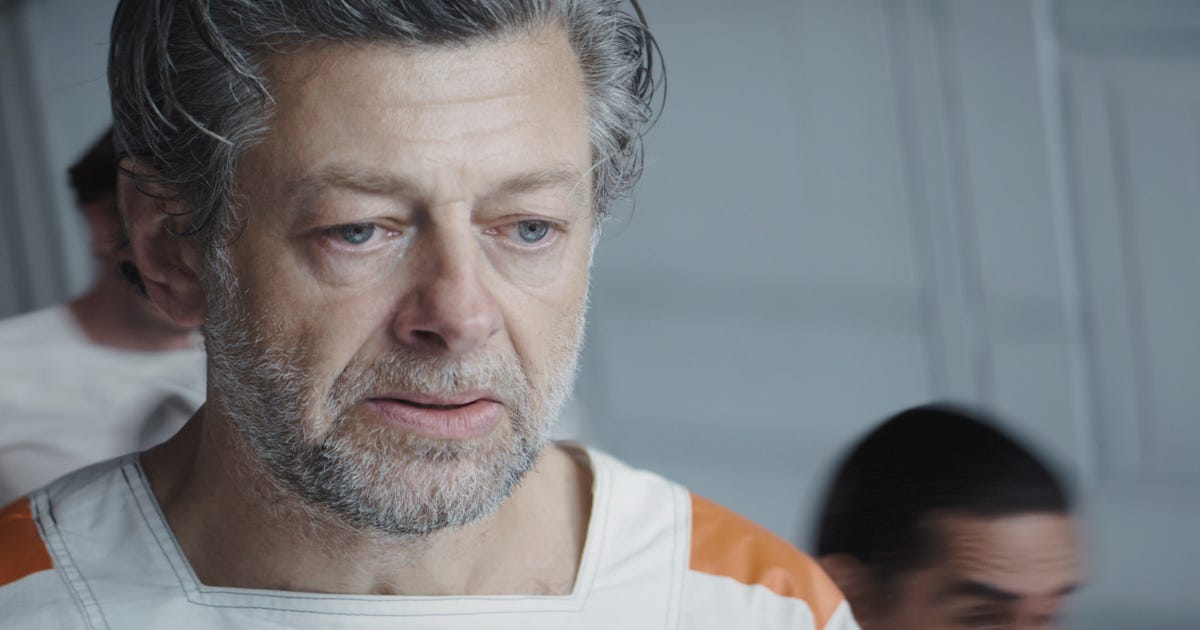‘Andor’ Writer Reveals Origin of Episode 10’s Heartbreaking Sacrifice
Andor’s prison arc ended with triumph and tragedy as episode 10 of the gritty Star Wars show came to Disney Plus last Wednesday. Cassian Andor (Diego Luna) lit the spark of rebellion against the Galactic Empire in new ally Kino Loy (Andy Serkis) and their fellow inmates.
It comes as the totalitarian regime viciously stamps out scattered resistance all over the galaxy, with enforcers like Dedra Meero (Denise Gough) spreading fear, and would-be collaborators like Syril Karn (Kyle Soller) only too happy to maintain this terrible status quo in the name of order.
Rebels like Mon Mothma (Genevieve O’Reilly) and Luthen Rael (Stellan Skarsgård) have been working from the shadows to bring the Empire crashing down, knowing discovery would bring ruin.
Every character in Andor faces sacrifice and complexity, and it’s all part of the plan hatched by creator Tony Gilroy, executive producer Sanne Wohlenberg and writer Beau Willimon, along with co-writer Dan Gilroy and the rest of the creative team.
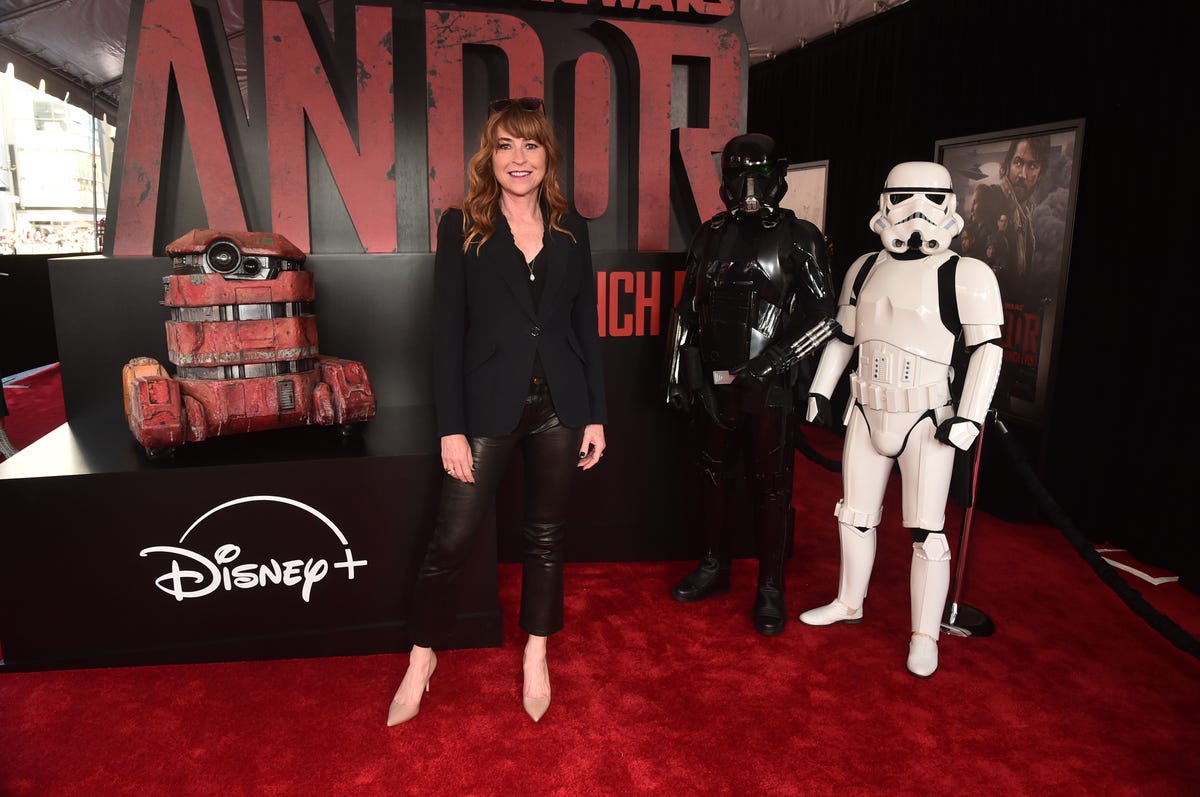
Sanne Wohlenberg says Andor tells a story of “ordinary people being empowered, making decisions and sacrifices to do extraordinary things for what they believe in.”
Alberto E. Rodriguez/Getty Images
Wohlenberg is best known as the producer of acclaimed 2019 HBO series Chernobyl, having also worked on Black Mirror and Doctor Who. Willimon served as showrunner on the first four seasons of Netflix’s House of Cards, created Hulu sci-fi series The First and co-wrote the screenplay for The Ides of March.
I had a fun Zoom chat with the enthusiastic Wohlenberg and Willimon about why I can’t stop thinking about Andor; the sound of the Empire’s terrible torture device; the Kino Loy twist; and the sacrifices our heroes have to make.
Here’s a transcript of our conversation, edited for clarity. It dives deep into SPOILERS for Andor episode 10, so you might want to hold off on reading until you’ve seen it.
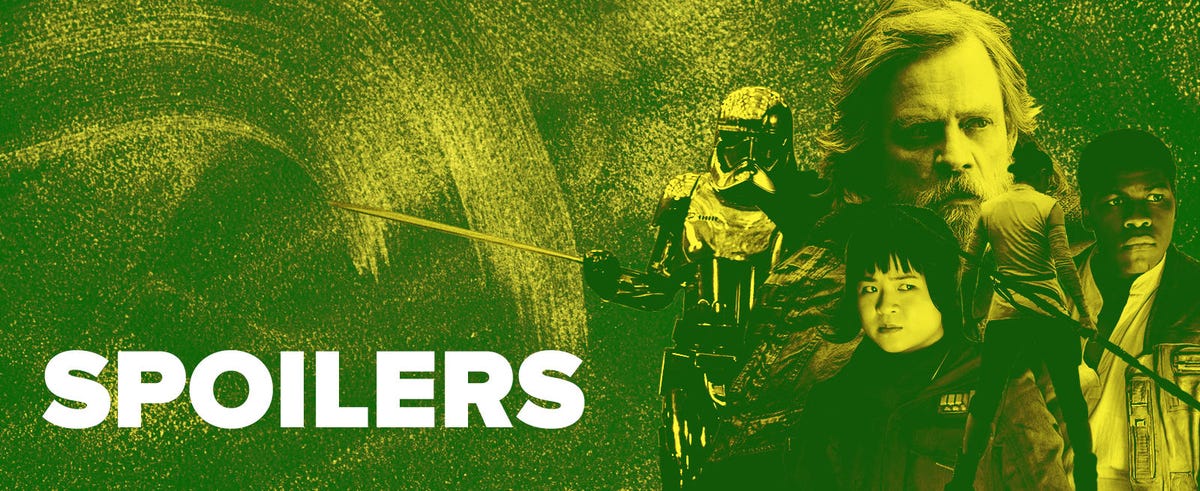
Q: I already asked Tony Gilroy this question, but I’d love to hear your perspectives too: Why is Andor so thought-provoking?
Sanne Wohlenberg: It deals with ordinary people caught in extraordinary circumstances in a time when the suppression of the Empire becomes something that is becoming increasingly intolerable. And that is the birthplace of this rebellion. [We’re] meeting a whole host of characters following Cassian, having gone back in time, and really telling the story of how this man becomes the rebel that gives his life for the cause. And he starts off far from the hero that he will become.
We’re telling the story of a lot of ordinary people being empowered, making decisions and sacrifices to do extraordinary things for what they believe in, or what they’ve been driven to. It’s just a very rich compost for thought-provoking and emotionally connected storytelling.

Beau Willimon wants Andor to be about characters’ emotional journeys.
Lucasfilm
Beau Willimon: One of the words that Sanne just said, “sacrifice,” is the key to all of this. Tony had a strong vision coming into the writers room, when we all got together. He had an 80-page bible that mapped out what he wanted to do with the first season.
There was some stuff that was super specific, Syril and Eddy’s relationship was totally thought out. And there were other things like the prison, for instance — that was sort of a placeholder and we weren’t exactly sure what it was going to be. We just knew something like that was going to happen after Aldhani.
But we had the advantage of knowing where this story ends, which is Rogue One. And you could say that’s a disadvantage because the audience knows where this is going to go. But if you decide not to hinge the strength of your storytelling on plot and suspense in that sense, but on character, emotional journeys and how people evolve over time, then the question isn’t whether he’s going to die at the end — we know he’s going to die in Rogue One. The question is, How does he become the person that’s willing to die in Rogue One?
And that boils down to sacrifice, because you have a character who at the end of this journey is going to make the ultimate sacrifice. And now if I can tell the story of how someone goes from being so far away from being willing to do that, to becoming that person. That is far more suspenseful, in a way, and fascinating than cheap plot surprises.
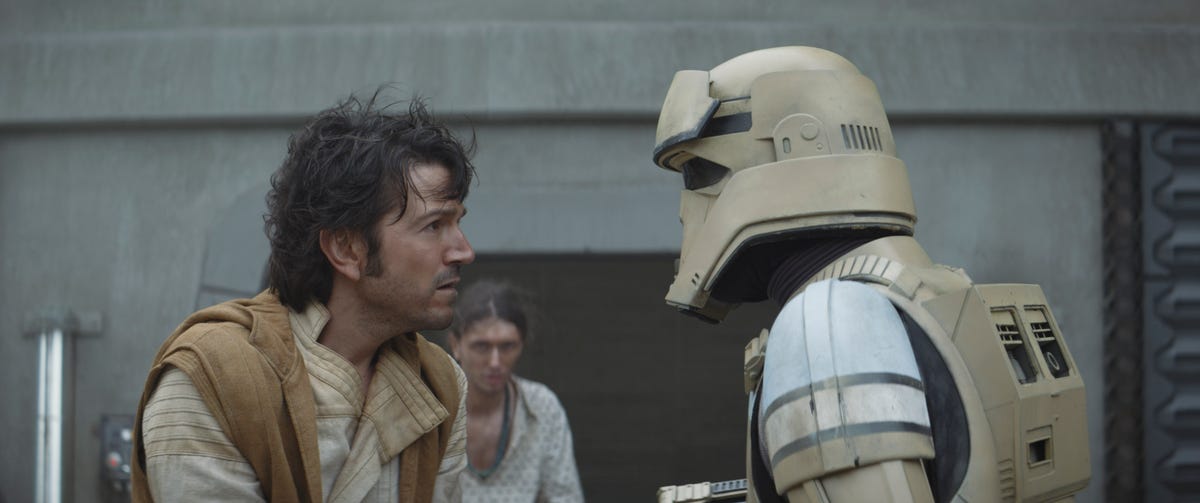
Cassian Andor is on the path to becoming the rebel we meet in Rogue One.
Lucasfilm
We get plenty of twists and turns along the way, and moments where you’re not sure exactly what will happen or how. But Tony wanted to approach it from that human perspective from day one. And I think when you approach it from the human perspective, it makes the story felt. And if you feel things, if you’re putting yourself in the shoes, not of a Cassian or a Kino or a Luthen, but also Syril and Dedra, you find that, “I’m weirdly rooting for Dedra at times, but hold on, I’m also rooting for Luthen. What does that mean?”
Like you have a conflict within yourself, born of emotion, that gets the synapses firing in the brain. It provokes thought in a chemical sense. And you then start to think about it, talk to others about it and have debates. But it starts from trying to feel something.
I find the Empire super engaging despite how horrible it is. I was rooting for Dedra up to a certain point. And that interrogation scene changed my perception of her.
Willimon: Yeah, we were like, how can we make the most terrifying torture scene that you haven’t seen before? And let’s make it psychological instead of physical.
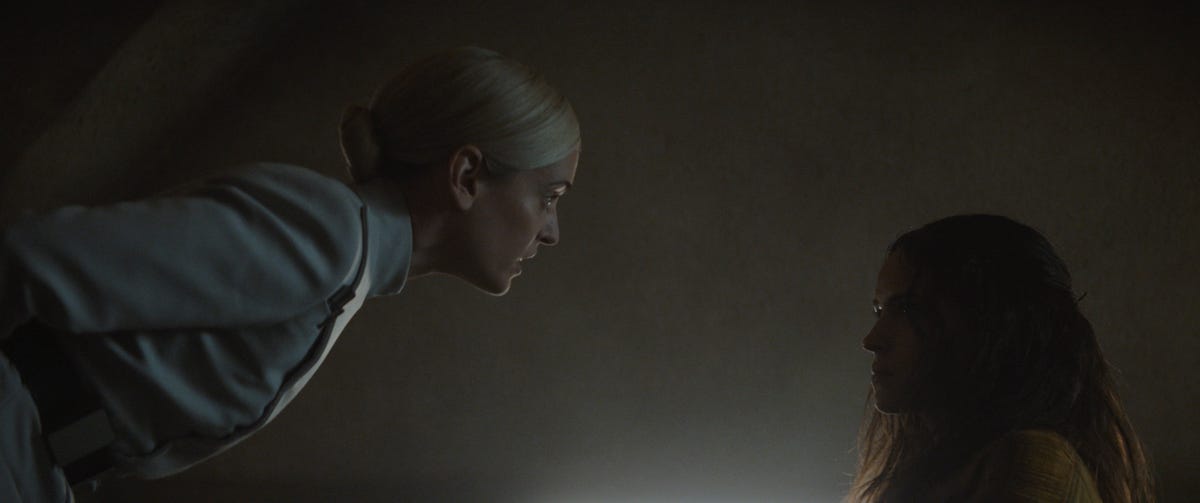
Dedra Meero introduces Bix Caleen to the Empire’s unpleasant new form of interrogation.
Lucasfilm
Do you have a sense of what that torture sounds like? Do you have it in your imagination?
Wohlenberg: I think it’s in everybody’s imagination. It gets described, and I think the imagination is a much stronger tool than ever trying to portray it. And it was very clear we had to leave it to people’s imagination. And I think that gives it its strength.
Willimon: We just wanted to get the audience to a place where basically — whatever is the worst possible, most terrifying, heart-wrenching sound you can imagine? Let’s lay the groundwork so that whatever that is for you is what you’re hearing.
The prison arc seems to highlight the power of collective action in a microcosm. Why do you think it’s so vital for people to work together against the Empire?
Wohlenberg: Generally, I think that is at the heart of what Luthen is trying to do. When you have a great power that you are trying to stand up against, all these little factions and everybody’s personal journeys make it very hard to be effective.
And I think the prison becomes a microcosm; suddenly Cassian turns into Luthen. As much as he initially only wants to break out of this terrible place, he ends up enabling Kino Loy, who was kind of a conspirator of the Empire because he’s playing along in order to get his freedom after 249 days. In the course of these three episodes, he actually becomes the rebel despite knowing that it will never mean freedom for him, tragically, because he can’t swim. It was exciting to have this really strong character arc for a guest actor.
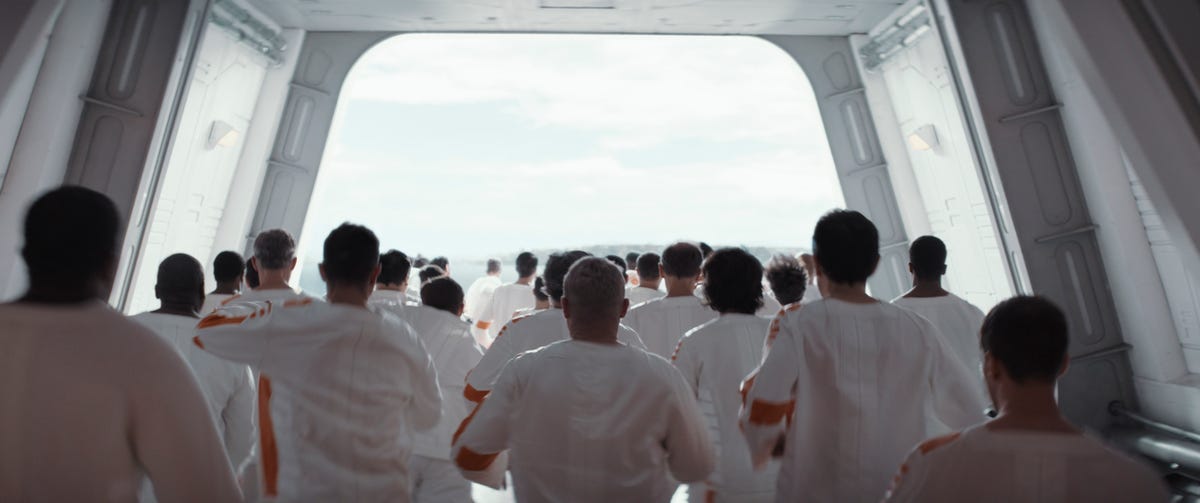
The Empire’s prisoners unite to make their escape.
Lucasfilm
And for Cassian, he’s in such a heightened place [with] all the anger and hatred for the Empire that he has carried since childhood, but he’s not trying really to actively address it. Suddenly it’s like this pressure cooker, and he makes a huge step towards becoming the rebel that will give his life in Rogue One.
Willimon: When you think of the rallying cry of “One way out,” you can think of that in a very literal sense — you can only go up and out, and dive into the lake. But if you think on a bigger level — all of these guys are chanting this together — you’re seeing [that the] only one way out of the oppression, and the Empire, is collectively working together. With risk and sacrifice. Some of us are going to die, some of us aren’t going to make it. But our only way out is together, en masse, with collective courage. That’s the bigger launcher for the rebellion.
That last scene, with Kino revealing that he couldn’t swim, was quite the emotional gut punch. Can you talk about how that twist came about?
Willimon: With the prison, we started from a very simple place:, how do we do a prison that you haven’t seen before? How do you do something fresh? How do you do a prison without bars or guns or guards? Maybe electric floors? If most prisons that you see are dark, dank and dirty, what if this one is super bright and clean? Do we want them to just be milling around all day? Or do we want them to be doing something? Well maybe they’re building something. What are they building?
So you start with things like that, and you start to build a story. And then you place the character like Kino at the center of it to show what a route to becoming a rebel looks like over three episodes. And then we had built this architecture, it’s kind of like Alcatraz, it’s this big hydraulic building that goes to the depth of the lake. And you’re dealing with the realities: Once they get out there, what are they going to have to do? How far is it to the shore? How long will it take to swim? How far do they have to dive down into the water?
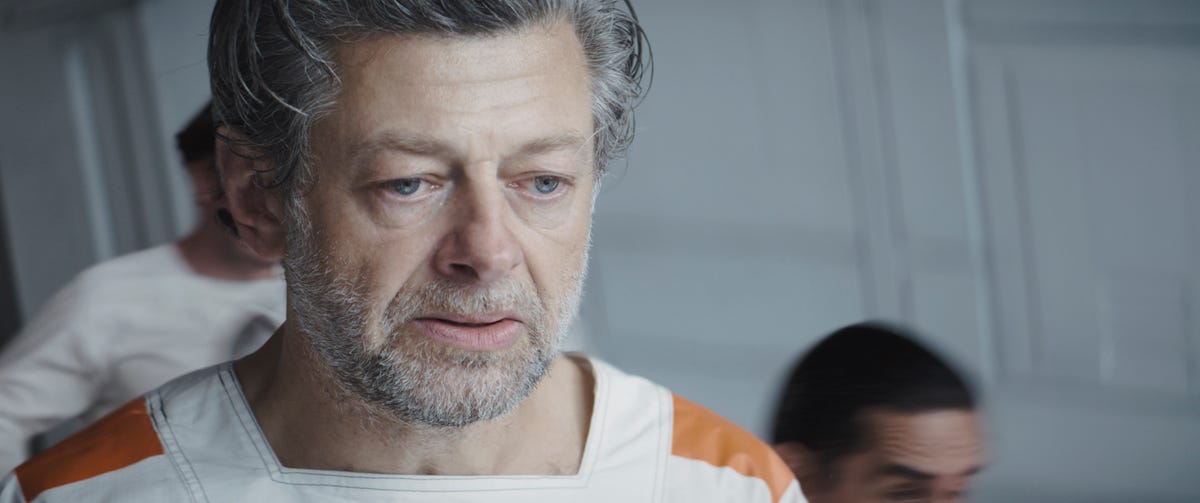
Kino Loy accepts that he has to make a sacrifice in Andor.
Lucasfilm
And you’re looking at every opportunity to have the most emotional impact. We’re tracking Kino. Is Kino gonna swim to the shore with Cassian? And if so, what does that look like? And what does that mean and where do they go? But then, and I forget who said it, but someone’s, like, “He can’t swim.”
When he said, at the beginning of that episode, “I’m going to assume I’m already dead,” he knows that even if he succeeds and gets up there, he’s never leaving this place. And so you’re like “Whoa, oh, my gosh.” When you stumble upon something like that, and it can come from the mundane realities of the physicality of the space you’ve created. And it gut punches you in the room when you’re writing something, you just know: That’s it. It’s so clear.
Whoever said that in the room, the moment it was said, it was almost silent for a few seconds. His greatest moment of triumph is also his greatest moment of tragedy. And when you can have both those things happen at the same time in the story, it’s golden. You ache for, you yearn for the handful of times in your life that you get to, as a writer, arrive at a moment like that.
I love the name Davo Sculdun so much. Who came up with that?
Willimon: I think I can actually take credit for this one, I’m pretty sure I came up with it. But if Tony tells you otherwise, he’s right.
Wohlenberg: I can’t remember. I’m Switzerland here.
Willimon: The name game is a fun one. Sometimes you land on one right away, and sometimes you waste a half hour trying to come up with a good name, or there’s a placeholder name.
Wohlenberg: But you always know the best idea in the room. You always know when a name just sounds absolutely right.
Willimon: It doesn’t really matter who came up with the name. The main thing is that we’re all servicing Tony’s vision. He walked in with such a clear vision. And our job was just to try to, with his leadership, make it better if we could. In the room itself, it was always the best idea won. And not in a competitive way. We all knew each other, trusted each other, respected each other, had a shorthand — we’re moving quickly. And then we all felt ownership over an idea; we all felt like we were contributing something. And so it wasn’t about who came up with what. It’s like, have we together — collective action as we were talking about — come up with the best story? And ultimately, Tony is the chef; he’s the arbiter of all that; his instincts are right.
Wohlenberg: He is a beautiful collaborator, and a real inspiration in allowing you to bring something to it. And I think that goes for every actor he works with, for all of our [heads of department]. It’s a really collaborative journey with a very clear and strong visionary leader at the top. I think that makes it a really exciting journey.
I loved how the scene with Davo is laid out, with the three characters sitting quite far apart in Mon Mothma’s beautiful apartment. That and the prison are beautiful sets, as are all the sets we’ve seen so far in Andor. My understanding is that they’re mostly practical?
Wohlenberg: With anything Star Wars-related, there’s a lot of [computer generated imagery] and things that come with the galaxy far, far away you’re dealing with. But we always try to do as much practical and real as we possibly can, for people to interact with. It’s all about the truthful reality and the emotional connection an artist can have with the space they inhabit, that informs who they are. And so a lot of our sets — we always try to create as much as possible for real.
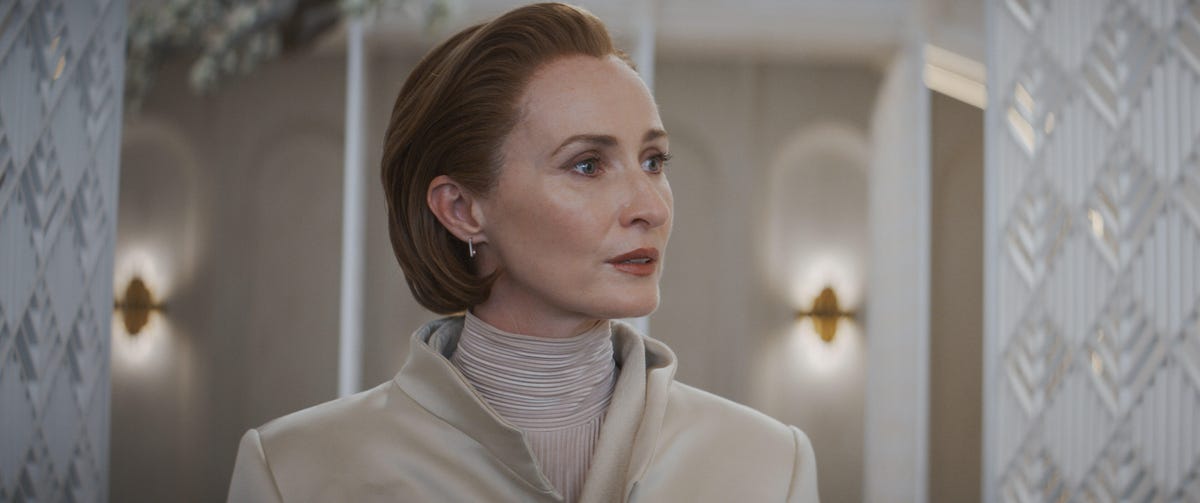
Mon Mothma plans her rebellion in pretty swish surroundings.
Lucasfilm
We are entirely blessed with [production designer] Luke Hull at the helm — his wonderful imagination in interpreting Tony’s vision, and Beau’s and Dan’s when they’re writing, to translate it into something that becomes a reality. [Hull] is a real joy. Without him, I can’t quite imagine Andor existing.
Jumping back to the idea of sacrifice, Luthen’s speech at the end of episode 10 is incredible. But it highlights the moral quandary both he and Mon Mothma face. How do you feel about that?
Wohlenberg: When you are part of the rebellion, there’s a whole load of difficult decisions to be made and a lot of sacrifice. And moral conundrums along the way — how far do you go to fight for the cause? And what is the action that you need? Constantly difficult decisions and the past that everybody has to navigate.
I think all our characters throughout the series are making decisions in the name of the cause. That’s what it means to join a rebellion and fight for it. I think that is really fascinating, it makes characters very three dimensional. They weren’t black and white; nobody is just good or just bad. And that’s a really huge trait of all the characters that Tony creates for the series.
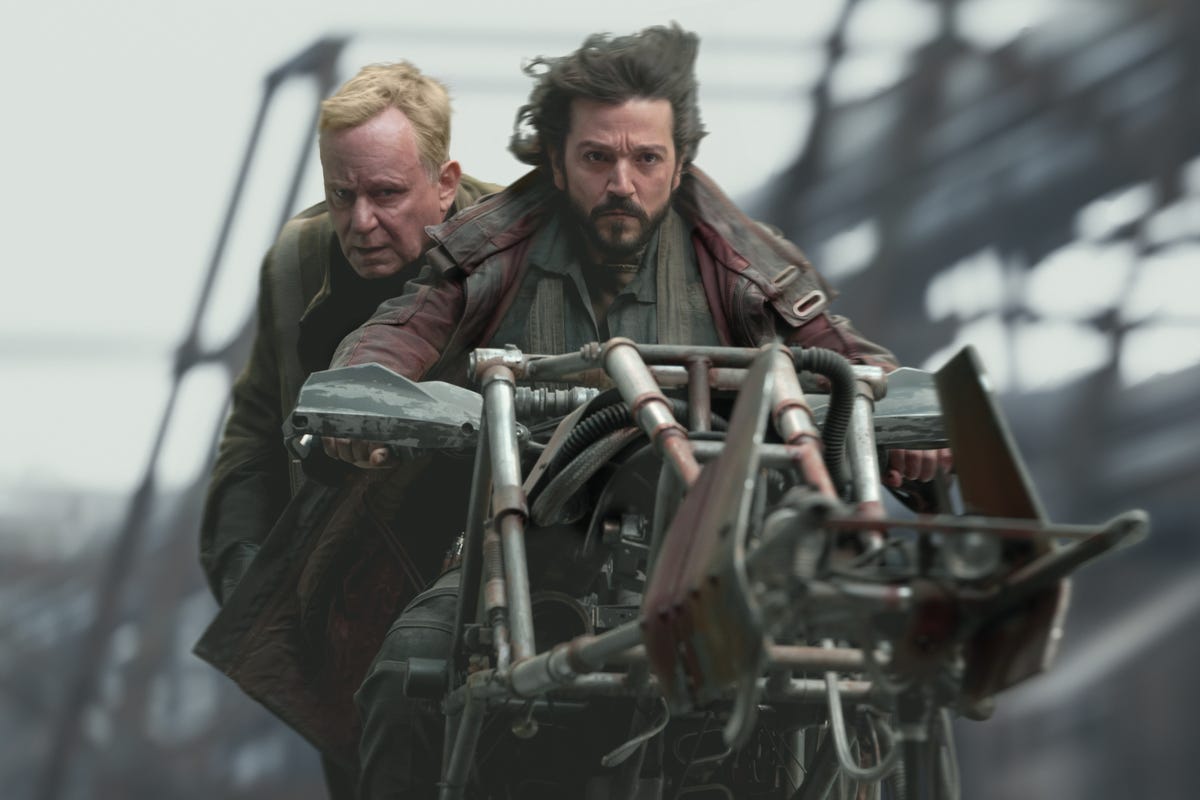
Luthen Rael puts Cassian on a rebellious new path, and accepts the sacrifices that life requires.
Lucasfilm
Willimon: We ask of every character, What sacrifice are they willing to make for what they believe in? And that can even be true of Syril or Dedra, but particularly when it comes to Luthen and Mon. We know Kassian will ultimately sacrifice his life. We know Mon as she will exist in the films, but we only get a little taste of her in those, so we’re discovering who this person is. And Luthen is a creation entirely born of Tony … And so you’re talking about these two characters, and what does sacrifice look like for them?
You could say the ultimate sacrifice is death. But if you’re a Mon, you’re potentially sacrificing — potentially, we don’t know what will happen — your daughter’s fate to the same one that you were consigned to. … Are you willing to sacrifice your daughter? In a sense, isn’t that almost a bigger ask than death? This is what she’s confronting.
And Luthen says it himself: “I’ve sacrificed everything.” He listed things that he sacrificed, the last of which is love, which is perhaps the biggest sacrifice you can make because a life without love is sunless. You’re already dead in a way.
And so I guess the show is proposing that if you want to achieve something at the scale that these people are trying to achieve, you have to be willing to make incredible sacrifices at great cost. And moral choices are only as good as the behavior that stems from them. So you can believe all the right things, but if you’re not willing to walk the walk, it’s useless. It’s meaningless. The only thing that matters is what you do. And that’s the question we’re constantly asking of these characters, and I think that’s what gives the show its dramatic impact and stakes.
2022’s Best TV Shows You Can’t Miss on Netflix, HBO, Disney Plus and More
See all photos
Movies Coming in 2022 From Marvel, Netflix, DC and More
See all photos
For all the latest world News Click Here

